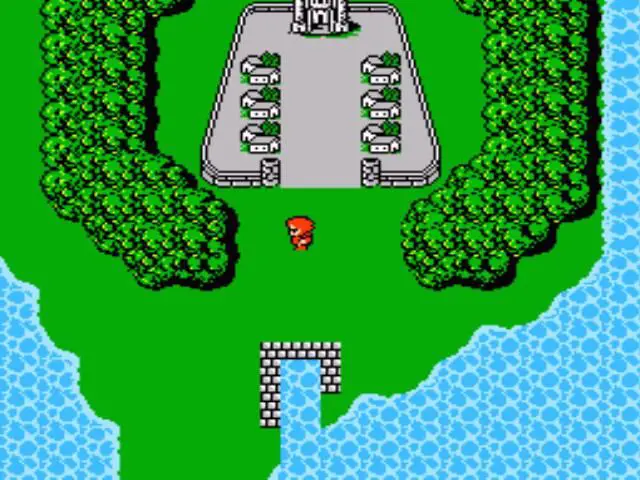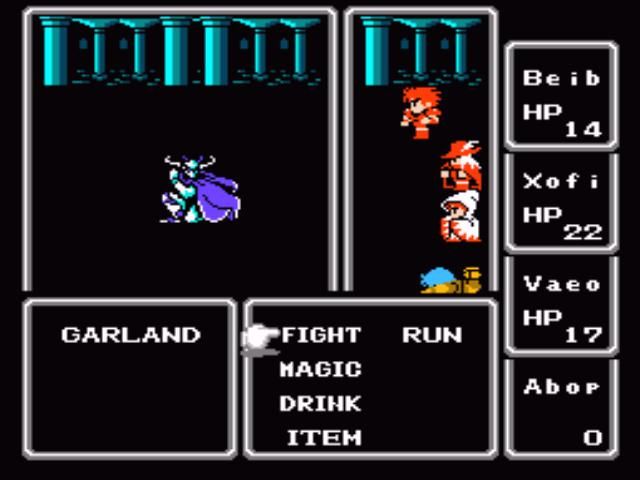The original Final Fantasy is a game that, while often lauded for its impact on the JRPG genre, is also commonly viewed as a poorly aged relic of a bygone age. It can be difficult to argue with this sentiment. After all, the original Final Fantasy for the NES is buggy, features a wildly inconsistent difficulty curve, and lacks many quality-of-life features we have come to expect. For a series known for its story and narrative, the first Final Fantasy is shockingly barebones, lacking the character-driven melodrama that fans have come to love. Despite all of that,I love this game. It is easily one of my favorite games both for the NES and for the 8-bit era as a whole. I say this despite never having grown up with the game or the NES. When I first experienced it I was in my mid-20s and by then the game was already considered ancient. Yet something about the game kept me enthralled throughout the entirety of its playtime. In fact, in preparation for writing this article, I decided to go back and replay the game and found myself hooked all over again. This is because Final Fantasy is a game that manages to stand the test of time not only in spite of its many flaws but in some instances, because of them.
A Timeless Tale

While some may say the barebones story of Final Fantasy is a weakness, I argue it is a strength; there is a purity in simplicity that later entries in the series lack. The player is never bogged down with overblown melodrama, nor are they burdened with complex politics or philosophy. While I enjoy a good yarn as much as the next person, this breezy approach to narrative is somewhat refreshing in a genre overflowing with complex and intricate tales. It also allows the narrative that does exist to feel much more personal. The game has no defined main characters, instead allowing players to create their own from among 6 starting classes. While not the most in-depth character creator in an RPG, it is hard not to get attached to these characters, especially since the game encourages a thorough understanding of their strengths and weaknesses. The lack of a strong narrative also means that there is much less railroading than in other entries in the series. Many of the game’s events must still be completed in a linear fashion, but in general, players are alloted much more freedom to explore the world. Whereas in other Final Fantasy games, it feels as though the player is merely a spectator of the events taking place, while in the original game, the player is an active participant.
Its a Feature, not a Bug

I have also come to appreciate many of the game’s mechanical quirks. One of the more infamous mechanics present in this game is ineffective attacks, wherein if an enemy is killed, any additional attacks that were selected to hit that target enemy are wasted. While this can be annoying, I also find that it forces the player to pay closer attention to every fight rather than simply mashing the attack button through each battle. Final Fantasy also utilizes a spell charge system that functions much like the spell slot system in D&D. While this is far less user-friendly than the more traditional magic-point system, I have found that it forces players to more carefully manage their magical resources. The fact that the challenge level of random encounters can often fluctuate wildly means that players are never truly safe and must constantly stay on their toes.
The key to playing this game is knowing when to exercise the better part of valor. It is vital to success that the player know when to beat a hasty retreat either back to town or to the overworld where you can rest, heal, and save. To this end, it is vital for players to understand their limitations, and not overextend themselves. Players should not expect to fully complete a dungeon the first time that they enter it, instead focus on learning the layout and looting it for treasure. Each time the player enters an area they will know more and be better prepared than the time prior until when they are ready to face the boss. If done correctly this style of play makes for a constant sense of excitement while also eliminating the need to level grind throughout most of the game. It also turns the original Final Fantasy into a game of careful resource management wherein the strategic use of a spell or item at a crucial time can allow the player to snatch victory from the jaws of defeat.
Admittedly, the original Final Fantasy is not a game that will appeal to everyone. I likely have a higher tolerance than most people for this sort of esoteric design. Nonetheless, I think that the game is worth celebrating for the unique experience that it creates both within its series as well as for JRPGs of this era. JRPGs during this time have a well-deserved reputation for being extremely slow-paced, grindy affairs, but Final Fantasy manages to stand out. The act of having to work around its anachronisms was something I approached like a puzzle to be solved. Solving that puzzle is an experience I still find immensely gratifying and believe others can too if approached with the right mindset.






